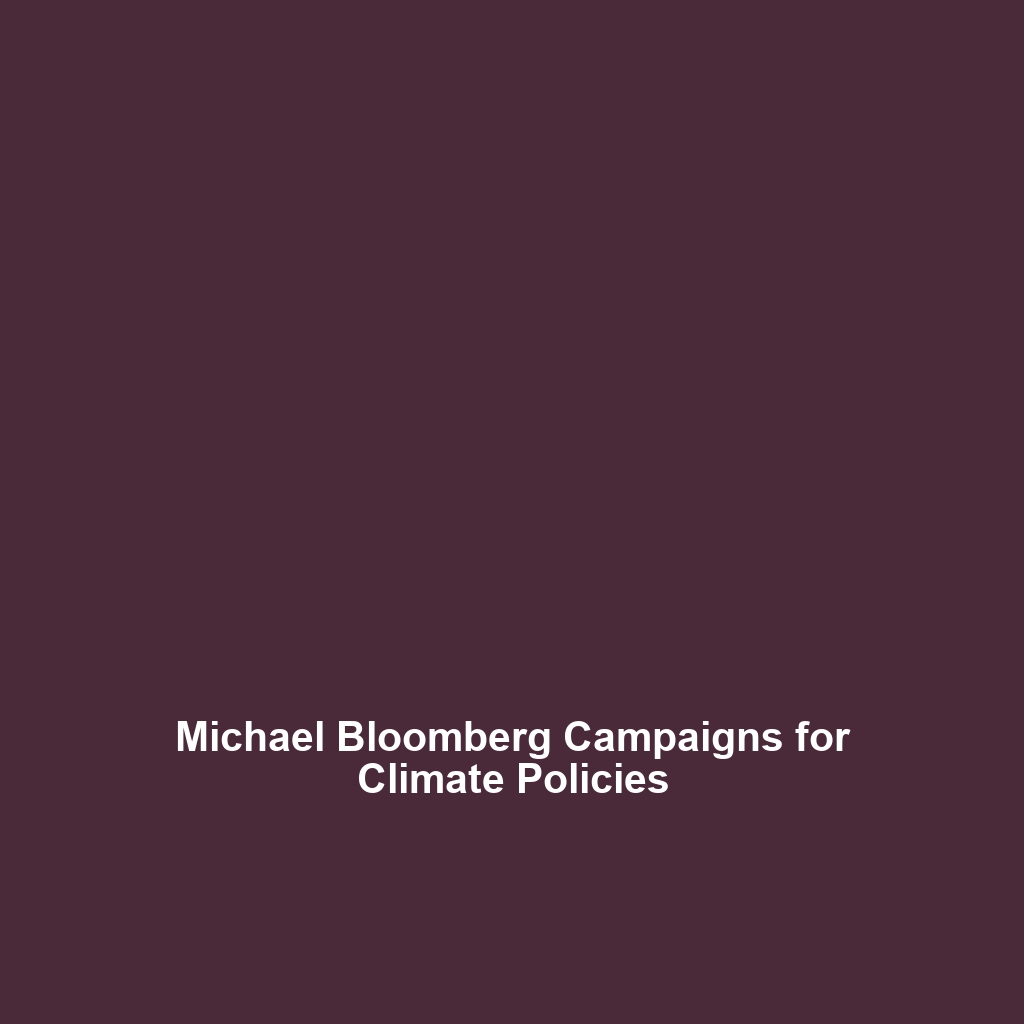Your cart is currently empty!
Tag: Paris Agreement

Michael Bloomberg Campaigns for Climate Policies
Michael Bloomberg Campaigns for Climate Policies
Michael Bloomberg Campaigns for Climate Policies
Former New York City Mayor Michael Bloomberg has announced a significant new initiative aimed at addressing climate change through the promotion of renewable energy in developing countries. This campaign will allocate $1 billion in funding to support sustainable energy solutions across several nations facing energy scarcity and environmental challenges.
Bloomberg’s Commitment to Climate Action
Bloomberg’s campaign is framed within his long-standing commitment to environmental issues. Having previously served as the United Nations’ Special Envoy for Climate Action, his latest initiative underscores the importance he places on international cooperation to mitigate climate change impacts. The United Nations Intergovernmental Panel on Climate Change (IPCC) has consistently highlighted the urgent need for countries to transition to renewable energy sources to limit global temperature rise to 1.5 degrees Celsius.
The $1 Billion Initiative
The $1 billion funding will be directed toward projects that enhance access to renewable energy in developing nations. Bloomberg has specifically targeted regions where energy poverty is prevalent, recognizing that nearly 800 million people globally still lack access to electricity, according to the World Bank. This initiative aims not only to provide sustainable energy solutions but also to drive economic growth and job creation in these regions.
Specific details of the initiative include the establishment of partnerships with local governments and non-governmental organizations (NGOs). These collaborations are intended to facilitate the building of renewable energy infrastructure such as solar panels, wind turbines, and other green technologies. Bloomberg has stated, “Investing in renewable energy is not just a moral imperative; it is an economic opportunity for nations looking to spur growth and improve quality of life.”
Global Urgency for Renewable Energy
Globally, the need for renewable energy has never been more pressing. The repercussions of climate change are being felt in various forms, including extreme weather events, rising sea levels, and resource scarcity. The energy transition is critical for achieving the targets laid out in the Paris Agreement, which seeks to limit global warming to well below 2 degrees Celsius and pursue efforts to limit the increase to 1.5 degrees Celsius.
According to a report from the International Renewable Energy Agency (IRENA), doubling the share of renewables in the energy mix could lead to a 70% reduction in greenhouse gas emissions by 2050. This presents both a challenge and an opportunity as countries must adapt to new energy realities while fostering resilient economies.
Expert Opinions on the Initiative
Experts have lauded Bloomberg’s initiative as a crucial step toward addressing the dual challenge of climate change and energy poverty. Dr. Jane Goodall, a prominent environmentalist, commented, “This initiative represents a vital shift in the narrative surrounding climate action. By focusing on developing countries, we are acknowledging that the effects of climate change are not uniform, and solutions need to be equitable and tailored.”
Additionally, environmental economist Dr. Thomas Hale stated that such funding can help catalyze private sector investment in renewable technologies, emphasizing, “The success of this initiative will depend not only on the funding but on how effectively it can leverage additional investments from private entities.”
Challenges Ahead
Despite the optimistic outlook, challenges abound. Critics point out that international politics often complicate the flow of aid to developing countries. Bureaucratic obstacles, corruption, and varying degrees of commitment to climate policies can dilute the potential impact of such investments. Furthermore, there is skepticism about whether the funds will reach the intended projects.
Additionally, some experts express concern over the implementation timelines. Energy projects can take years, even decades, to develop and may face opposition from local communities. Engaging local populations will be crucial to ensure that the projects are not only accepted but embraced.
Potential Impact on Global Policies
Bloomberg’s initiative may also have implications beyond the immediate project scope. By allocating substantial resources to renewable energy in developing nations, he is setting a precedent for future investments in climate-friendly projects on a global scale. This initiative has the potential to influence public policy, encouraging other wealthy nations and private investors to emulate this model.
Furthermore, the campaign’s focus on renewable energy can help push forward broader discussions around climate change, arguably serving as a catalyst for more comprehensive international agreements and commitments. A successful rollout may ignite global ambition, galvanizing more actors in the fight against climate change.
Conclusion
Michael Bloomberg’s $1 billion campaign for climate policies marks a significant step in promoting renewable energy in developing countries. While challenges remain, the potential benefits for both the environment and economies in these regions could be profound. By fostering partnerships and driving investment, Bloomberg’s initiative aims not only to combat climate change but also to uplift communities through sustainable development.
This ambitious endeavor calls on the global community for collaboration, urging nations to unite in the collective goal of sustainability. As Bloomberg stated, “The fight against climate change must be viewed as an opportunity for creating a better future for all.” Future developments will be closely watched as this initiative unfolds, promising to reshape the approach to climate action in developing countries.